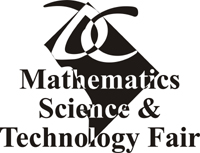Welcome to the 57th Annual District of Columbia City-wide Mathematics,
Science and Technology Fair
(updated Monday March 31, 2003)
Events:
Friday March 14
- Project set-up by from 3 PM to 6 PM at Burr Gymnasium
- Students with pre-registered and approved projects are eligible to
set up their project boards.
|
Saturday March 15
- 8-8:30 AM: Students and Judges arrive at Burr Gymnasium
- Judging of Projects: 8:45 AM to approximately noon
- Grand Award Judging: 1 PM to 3:30 PM. All FIRST PLACE winners
in the senior categories are asked to stay for the Grand Award judging.
Lunch will be provided for these students.
|
Sunday March 16
- Public Viewing of Projects: Noon to 2 PM
- Awards Ceremony: 2 PM to 4 PM
- 4 PM to 5 PM: Breakdown and removal of projects. Projects that
are not picked up will be discarded.
|
Intel sponsors another science, mathematics and engineering
talent search, the Intel Science Talent Search. Winners of this program were
announced on Tuesday March 11. 2003
Winners. DCPS Grand Prize winner, Sabrina
Snell, of The School Without Walls, is also one of the TOP 40 in the Intel
Science Talent Search!
Strategies for making science fair projects part of your standards-based
curriculum scope and sequence
International Science and Engineering
Fair rules and guidelines available here: http://www.sciserv.org/isef/document/
1. Weave authentic science learning into the curriculum through the project
work.
Post students' questions around the room. Use fill time or warm-up time to
have students discuss these questions and turn them into experiementally approachable
projects.
2. Weave in performance and authentic assessment by using the judges' guide
as the starting point for assessment.
(From the ISEF judges' guide) Assessment will examine art, writing, mathematics
and science, creativity, logic, evidence, analysis, communication and presentation,
information technology, adherence to instructions, adherence to deadlines.
3. Use the science fair documents as your reading material.
Students discuss the meanings of rules and instructions, look up documentation
referenced in the instructions, provide information in the very manner requested
Resources for science
project development and display
Ideas for specific
projects
National Association of Biology Teachers' Position
Statements (Use of Animals in the Classroom, Teaching of Evolution, etc.)
National Science Teachers' Association Position
Statements
Research using animals
This website maintained by
Dr. Toby Horn, DC ACTS in DCPS

